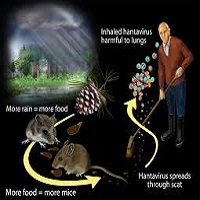The country where the pandemic COVID-19 started just started recovering when a report surfaced that a new virus has hit China.
The man died on a chartered bus and later tested positive of Hantavirus. The other passengers were also tested for the virus.
The news immediately went viral in social media and has spread fears to many. Hantavirus is known to have similar symptoms as a coronavirus infection.
What is Hantavirus?
Orthohantavirus is an old family of viruses, which mainly spreads through rodents or rats. It can cause various diseases, including hantavirus pulmonary syndrome (HPS). It can also cause hemorrhagic fever with renal syndrome (HFRS), as per the Centers for Disease Control and Prevention (CDC).
The CDC website reads, “Hantaviruses in the Americas are known as ‘New World’ hantaviruses and may cause hantavirus pulmonary syndrome (HPS). Other hantaviruses, known as ‘Old World’ hantaviruses, are found mostly in Europe and Asia and may cause hemorrhagic fever with renal syndrome (HFRS).”
How do you get it?
It is transmitted when a person comes in direct contact with the droppings, urine, saliva, or nesting of a rodent that has the virus. The virus enters the human body through eyes, nose, or mouth.
Is it contagious like COVID-19?
No. Hantavirus is rarely known to have spread from person-to-person.
Is it airborne?
No, Hantavirus is not airborne. It can only be spread if one comes in direct contact with the infected rodent or its feces. It is also not known to spread through a bite from the infected rat.
What Are The Causes And Symptoms of Hantavirus?
Some of the early symptoms of Hantavirus include muscle ache in hips, thighs, back and shoulder other than fever and fatigue. Some people also experience vomiting, nausea, abdominal pain and diarrhoea. The incubation period is believed to be between one to eight days post their exposure to the urine, droppings or saliva of the infected rodent. When left untreated for 10 days, late HPS will start appearing in those people. It includes coughing and shortness of breath.
How dangerous is it?
Hantavirus can be fatal if left untreated. Centers for Disease Control and Prevention (CDC) reported it has a mortality rate of 38 percent. Patients commonly die of acute shock, low blood pressure, acute kidney failure, and vascular leakage.
How to know if you have it?
The Hantavirus diagnosis is a challenge as the symptoms are similar to many other diseases such as regular flu, pneumonia, influenza, and coronavirus. Those who have a fever and are exposed to rats should be tested for the virus.
Is there a cure?
It has no known treatment or vaccines. Those infected with the virus are kept in the ICU to monitor and ease their respiratory distress.
